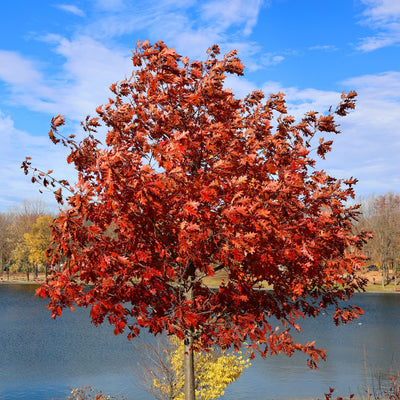Benefits of Habitat Plants For Restoration
In lush green Tennessee, the forests in North Africa, China, and the eastern United States decreased by approximately one-third during the last 300 years. Deforestation and the loss of other natural habitat plants will likely continue as the global human population increases. Suburban sprawl continues to negatively impact ecosystems, making restoration planting projects more vital than ever before.
Many of our community members advocate for natural restoration plantings because the loss of habitat plants reduces the ecosystem’s ability to process C02 emissions. Others mourn the loss of Tennessee’s natural beauty. Regardless of where you hang your hat, we can all agree that reintroducing habitat plants to repurposed land remains essential to maintaining our state’s natural beauty. As experienced professionals, we strongly support natural restoration plantings, and our TN nursery team members hope the following information inspires you to act.
What You Need To Know About Natural Habitats
A natural habitat generally includes land, water, animal species, and plant life, among others, characteristic of a specific region. The types of native habitat plants in an area flourish because of soil and other environmental conditions. In turn, Wildlife benefits from the trees, plant life, and other organisms in the micro-ecosystem. Environmental experts typically identify five types of natural habitats.
- Grasslands
- Deserts
- Polar Regions
- Aquatic Habitats
- Forests
Experts highlight several subtypes of forests, including Tropical, Boreal, and Temperate. Tennessee forests fall into the Temperate type, characterized by oak, maple, and elm trees, among others. Wildlife in Temperate forests usually includes black bears, eagles, bobcats, and foxes. Because many tracts have been repurposed for agricultural use and to build suburban landscapes, restoration efforts remain necessary.
What Are The Benefits of Increased Habitat Plants & Reforestation Projects?
Humans and nature must strike a harmonious land use balance. People rely on land clearing to create farmlands to deliver necessary foods. Logging also remains vital to provide lumber materials for home-building and other human needs. We must also recognize that repurposing forests establishes a responsibility to ensure natural habitats continue to thrive, and restoration planting projects offer a pathway to success. Replanting trees after clear-cutting projects and adding habitat plants to abandoned land, as well as areas of suburban sprawl, results in the following benefits.
- Job Opportunities: Forests and restoration planting projects support 3 million American jobs. They also positively impact industries such as equipment manufacturing and local businesses like our TN nursery.
- Improved Wildlife: A diverse mixture of hardwoods and softwoods increases biodiversity. Couple these plantings with things such as shrubs and hearty undergrowth, and wildlife flourishes. Deer and other populations rely on these food resources to maintain healthy herds.
- Water Quality: Root systems and firm soil help improve water filtration. Habitat plantings reduce the impurities that can seep into aquifers and taint drinking water resources.
- Air Quality: Reforestation increases the number of trees that process carbon emissions and increases breathable oxygen. Human beings benefit from clean air, which may also reduce ailments such as asthma in young children.
Along with these quantifiable benefits, a strong link exists between natural immersion and human wellness. Practices such as the Japanese “forest bathing†and North American mindfulness meditation link emotional wellbeing to nature. Increasing the number of natural habitat plants delivers significant qualitative benefits as well.
Local TN Habitat Plants For Restoration Planting Projects
Although imported flowers, grasses, and trees remain excellent landscaping assets, natural habitat plants directly impact the state’s ecosystem. As a TN nursery committed to environmental success and keeping our community beautiful, we stock the following inventory for natural restoration plantings and reforestation.
- Loblolly Pine Seedlings
- Ponderosa Pine Seedlings
- Tulip Poplar Seedlings
- Redbud Seedlings
- Spruce Pine Seedlings
- Swamp Chestnut Oak Seedlings
- Sugar Maple Seedlings
- White Oak Seedlings
- Swamp White Oak Seedlings
- Red Oak Tree Seedlings
- Red Maple Tree Seedlings
- Silky Willow Live Stakes
- Pin Oak Seedlings
- Sourwood Tree Seedlings
- River Birch Seedlings
- Broome Sedge
- Pennsylvania Sedge
- Cherokee Sedge
- Texas Sedge
- Button Bush Live Stakes
- Bracken Fern
- Christmas Fern
- Ostrich Fern
- Lady Fern
- Smooth Cord-Grass
- Soft Rush Grass
- Virginia Creeper
- Orchard Grass
- Black Eyed Susan
- Iris Cristata Plant
- Pachysandra Plant
- River Cane Plants
- Nine Bark Live Stakes
Maintaining and restoring our green spaces requires an unspoken partnership between human beings and the natural world. Replanting hundreds of trees after a logging endeavor or a few habitat plants on your property adds to a healthy environment.
Become A Steward Of The Land By Restoring Habitat Plants Found At Your TN Nursery
People can take proactive measures every day to ensure the next generation enjoys a thriving, healthy environment. Your reforestation and restoration planting projects help improve the air we breathe, the water we drink, and the fantastic TN wildlife. If you recently clear-cut land or own a parcel that could benefit from habitat plants, our TN nursery has a wide selection, and we are happy to answer any questions.


